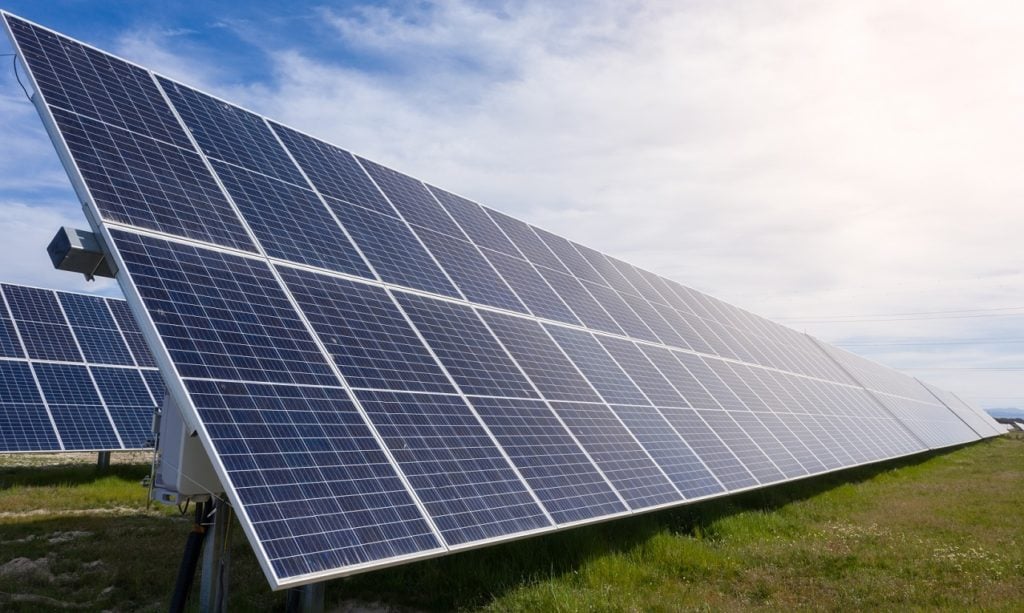
Solar testing firm PI Berlin has joined Europe’s new supply chain assurance scheme to develop confidence in how and where PV products are manufactured, a Solar Power Europe (SPE) policy advisor has told PV Tech Premium.
Launched in October, the Solar Stewardship Initiative (SSI) aims to develop responsible, transparent and sustainable solar value chains through the SSI Code, a comprehensive corporate sustainability standard.
Unlock unlimited access for 12 whole months of distinctive global analysis
Photovoltaics International is now included.
- Regular insight and analysis of the industry’s biggest developments
- In-depth interviews with the industry’s leading figures
- Unlimited digital access to the PV Tech Power journal catalogue
- Unlimited digital access to the Photovoltaics International journal catalogue
- Access to more than 1,000 technical papers
- Discounts on Solar Media’s portfolio of events, in-person and virtual
Or continue reading this article for free
Alexia Ruvoletto, SPE’s senior policy advisor on trade, said that the Dragonfly Initiative (TDI), which is already part of the SSI, are “experts in building these kinds of initiatives from the ground up and have expertise across all industries, but not specific to solar”.
As a result, the SSI’s sponsors decided that the initiative also needed solar experts that could train auditors to go on site visits with an understanding of the peculiarities of a solar value chain, hence the deal with PI Berlin, a technical advisor, risk manager and quality assurance provider in PV technology.
PI Berlin was acquired by Kiwa Group in May this year. At the time, Sven Lehmann, CEO and founder at PI Berlin, said the company had been looking for a strong partner to unlock further growth. The new deal would also allow PI Berlin to build on its factory-focused services by integrating them with PV Evolution Labs (PVEL), which was also bought by Kiwa Group last year.
Pilot scheme
Regarding the global pilot scheme rollout this month, Ruvoletto said it is on schedule but sites and dates are still being confirmed to start in the first quarter of 2023. The pilots will span across Europe and Asia including China. An equivalence exercise will be carried out in Europe to cross reference with existing standards to avoid duplicating work and creating audit fatigue.
Having been birthed in Europe, the SSI’s main goal is to make sure that all products imported to Europe respect certain requirements in the environmental, social and governance field, however, the long-term ambition is to make it a global standard, said Ruvoletto. The code defining the various requirements will be revised after the pilot scheme.
“The pilot’s objective is not to test companies, but to test the system and see that it works effectively,” said Ruvoletto. “Of course, we’ll also incidentally get information about the average performance of the participants.”
Changes in the supply chain are already being brought about by various countries’ trade policies. India is on a major push to support its domestic manufacturing and its approved list of models and manufacturers scheme is hindering the supply of foreign modules into the country. Meanwhile the US is adjusting to its Inflation Reduction Act.
Given these current shifts, SPE is taking a long-term view with the SSI aiming to build a system that can function sustainably in the future rather than just tackling issues that are here and now, added Ruvoletto.
Transparency is important to obtain assurance in supply chains, but the further upstream sectors have less traceability. Nonetheless, Ruvoletto said the early signs of the pilots are encouraging. Another problem in terms of the extraction of raw materials is that it is not exclusive to the solar industry. As a result, the SSI consultants are exploring ways of adopting an existing mining standard.
Legislative differences
The SSI is modelled on the current legislative process within Europe; one of the goals is to help members comply with the newly adopted legislation including the corporate sustainability due diligence directive and the forced labour product ban.
Following such EU directives could be at odds with other nations. The US, for example, does not have a due diligence legislation. It does have the Uyghur Forced Labor Prevention Act, but Ruvoletto said that preliminary discussions with the European Commission suggested its own proposals would be different.
The US act makes a presumption that all products coming from Xinjiang are made with forced labour and so the burden of proof lies with the companies to prove that their products are not made with forced labour, while the EU is initially putting the burden of proof on the national authorities, added Ruvoletto. Such differences would have an impact on the suitability of the SSI for some jurisdictions.
Recycling
Part of the SSI includes a focus on the recyclability of PV modules and SPE was one of the founding members of PV Cycle, a platform that deals with recyclability of solar panels. Cost efficiency at scale is a key issue when recycling panels, but due to the long lifetime of PV equipment and its relative recent rollout, there isn’t enough recycling available to build up capacity to attempt that, said Bethany Meban, SPE senior press and communications advisor.
Recycling like-for-like is also constrained. For example, polysilicon recycled from solar panels currently goes to different end-use sectors, because a high degree of quality is needed for PV modules, whereas aluminium can go back into the supply chain. While the SSI does have some lifecycle requirements, full circularity is not yet possible though this may change with technological advancements in the future. SPE has already published best practices for maintenance and prolonging module lifespans.
The full rollout of the SSI assurance scheme is due to begin in December 2023.
